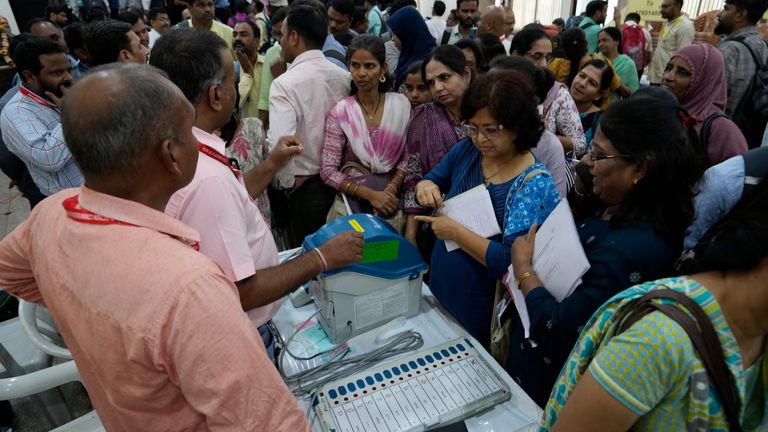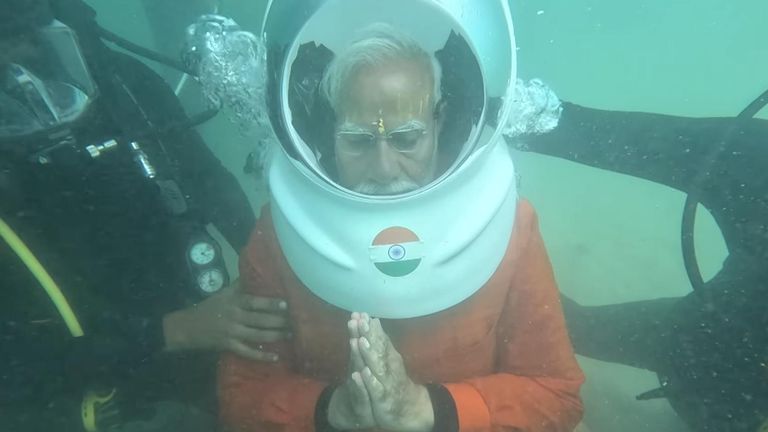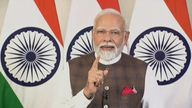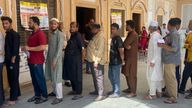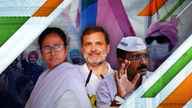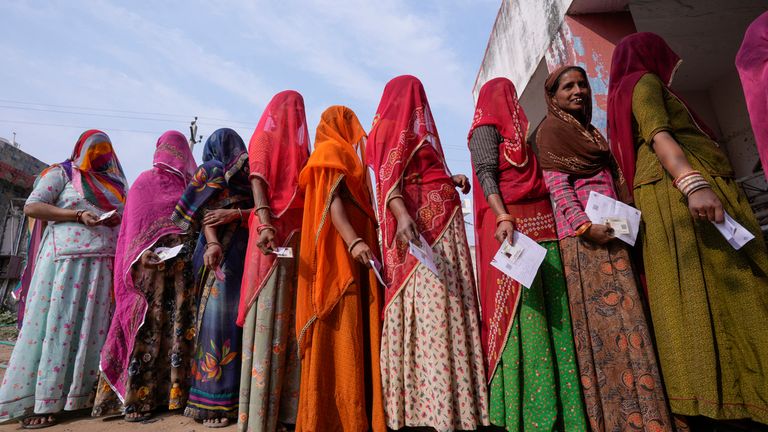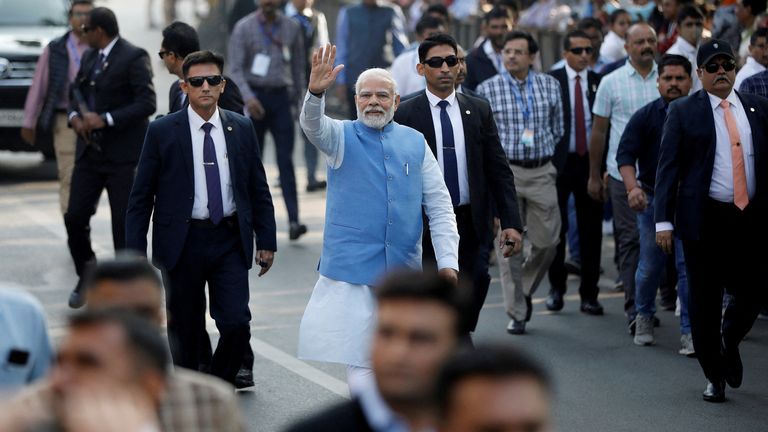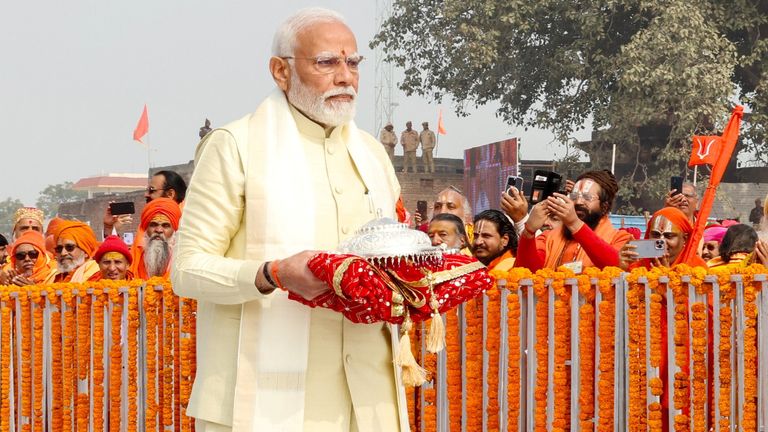India's colossal election season begins as Modi seeks third term
India's mammoth election season has kicked off. Almost a billion people will cast their vote over the next 44 days to elect its government.
Thursday 18 April 2024 04:52, UK
As the Prime Minister's car approaches, the chants of "Modi!" are deafening. His cavalcade moves at walking pace and as it nears, the people surge forwards with their phones out, snapping the moment for posterity.
The atmosphere is carnival-like, with blaring music, drums and dancers in traditional Indian clothes.
Narendra Modi, 73, has kicked off his campaign for a third term with a roadshow in Ghaziabad, a city in the northern state of Uttar Pradesh.
Shishir Gupta is here with his family. "I'm not interested in the candidate," he says. "It's because of Modi every BJP candidate wins, I'm here to see him."
Atul Garg, the Bharatiya Janata Party (BJP) candidate of Ghaziabad who was lucky to get a personal endorsement from Mr Modi, echoes the same sentiment. At a gathering in Dholara, Mr Garg says: "I don't need to campaign, we are just wasting time and effort, people will vote only for Modi."
Mr Garg's own campaign lacks enthusiasm. Rather than for himself, he seeks votes in the name of PM Modi.
India's mammoth election season has kicked off. Almost a billion people will cast their vote over the next 44 days to elect its government.
The elections to the 18th Lok Sabha (parliament) will be held in seven phases from 19 April to 1 June, with results on 4 June.
Organising the national vote is a colossal task.
Around 15 million polling officials and security forces will oversee 5.5 million electronic voting machines (EVM) installed in over a million polling stations across the country.
Thousands of candidates from over 2,400 parties will be in the fray. During the election in 2019, there were more than 8,000 candidates running.
India has one of the most expensive elections in the world. In 2019, parties and candidates spent an estimated $8.7bn (£7bn) to woo more than 900 million eligible voters.
Undoubtedly PM Modi is the most popular politician and is expected to win his third term in office. In alliance with 18 regional parties the BJP heads the National Democratic Alliance that won 346 out of the 543 seats in 2019.
Mr Modi is challenged by a Congress-led coalition of 28 parties, the United Progressive Alliance, that won 108 of the 543 seats in 2019.
Opposition parties accuse Mr Modi of using federal agencies to cripple them by raids, intimidation, freezing bank accounts and in some cases sending their leaders to jail.
Delhi's chief minister was arrested on corruption charges a few weeks before the elections. Thousands of his supporters took to the streets in protest.
Congress leader Rahul Gandhi said the upcoming election is "fundamentally different" as democracy has never been "as much at risk as it is today".
Dismissing these allegations, BJP spokesman Nalin Kohli tells Sky News that under Congress between 2004 and 2014, the "biggest scams in the history of India" took place, but Mr Modi's government "does not permit it".
Read more:
Thousands protest against Modi over arrest of his top political rival
Arvind Kejriwal detained: Indian court extends custody of top political rival
He says: "Why do you not see voters rejecting the BJP in a large number? Why are we winning state elections?" He adds he found it "difficult to believe" that hundreds of millions would vote for a "government that doesn't deliver".
The consecration of the Ram Temple in Ayodhya, which has been a long-standing demand of Mr Modi's party and the majority community, has given India's leader a major boost.
The abrogation of the special status of Jammu and Kashmir, the only Muslim majority state, was another historical demand which projected Mr Modi as a patriot par excellence.
But the opposition, which is concerned with issues of unemployment, the cost of living and the threat to India's secular and democratic identity, has tried to paint Mr Modi as someone who works only for capitalists.
India has a federal structure, and traditionally state and Federal elections are fought on separate issues. But this has changed under Modi into a more presidential form with him as a central figure.
In a number of states, the opposition parties have come together in a seat sharing arrangement. Where one party has forgone a seat and in support of a combined candidate against the BJP.
This larger vote share will surely outdo the BJP in a several constituencies, but there are inherent contradictions. In many cases these parties fight each other where the BJP is not the principal opponent. Party workers find it difficult to convince voters that they are on the same side but only against Modi.
The opposition are yet to come out with a common manifesto. But the common strand is on issues of unemployment, cost of living, threat to India's secular and democratic identity, social justice and farmers issues.
They have tried to paint Modi as some who works only for capitalists and certain industrialists.
Modi and minorities
For a decade Mr Modi has dominated India's political space. With a mix of muscular religious identity and nationalism he has crafted his image as a leader of the majority Hindu nation that has taken its rightful place.
Even though he underlines his achievements of economic progress and development for all, minorities - especially the Muslim community which constitutes over 200 million people - feel marginalised and persecuted.
Mr Modi's silence on the many instances of lynching of Muslim men for alleged trading in cow meat and bulldozing of homes belonging to Muslims, has been deafening.
Allegations emerged that state governments ruled by his party look the other way when violence is perpetuated against minorities by right-wing Hindu mobs.
Mr Kohli says "under BJP governments riots don't take place or seldom and whenever they have taken place the government has acted. Check the data, it speaks for itself. No one is treated differently, irrespective of region, colour, race or language. Everyone is equal before law".
Modi'nomics
Mr Modi is never shy of boasting his economic achievements. In 2019 India overtook Britain as the 5th largest economy in the world but its GDP per capita remains dismal.
Inequality is at a historic high, even starker than under colonial Britain. According to a report by the Paris-based World Inequalities Lab, India's top 1% population controls 40 % of the nation's wealth, higher than the US, South Africa and Brazil.
Unemployment has plagued the government as it at times reached a 45-year high. With one of the largest populations of young people, the issue will play a role in the elections.
Cost of living and inflation has also soared and has had a detrimental effect on household savings which are now at a five-decade low.
Rural distress, stagnation and falling farming incomes have led to a number of protests by farmers. According to Samyukta Kisan Morcha, an umbrella of farm unions, over 100,000 farmers have committed suicide in the last 10 years of Mr Modi's rule.
Meanwhile, stock markets soar and the wealth of billionaires balloons.
India ranks 111th of the 125 nations in the Global Hunger Index (2023) report. Mr Modi's government, however, has rejected the report.
India is home to over a third of the world's malnourished children, which is not only a health crisis but has a wider impact on the economy.
A 2023 joint report by FAO, UNICEF, WHO and WFP, found that 74% of the population cannot afford healthy food.
In November last year Mr Modi announced the extension of a free food ration scheme to 800 million Indians for the next five years.
Mr Modi is credited with cleaning up the financial system and reforms in the banking sector, goods and services taxation, digitalisation and making the system investor-friendly.
His government's focus on building and developing India's creaking infrastructure has provided the much-needed boost to the economy.
His success has been in the range and delivery of welfare schemes which has made him popular with the masses.
In rural India welfare schemes have been expanded with half a billion new bank accounts, free gas connection, millions of houses for the poor and over 40 million toilets constructed.
Be the first to get Breaking News
Install the Sky News app for free


"From a woman's perspective it's a game changer, she doesn't have to go to a field [to] defecate in the open," says Nalin Kohli.
"Forget about privacy, it's about security but most importantly it's about dignity. If you look at the last 10 years in several areas the speed and the scale at which work and progress has taken place is not seen ever by India."
Once a pariah in the Western world because of communal clashes when he was chief minister of Gujarat, Mr Modi is now courted by world leaders.
India's soaring growth and vast middle class market is too attractive to be ignored.

